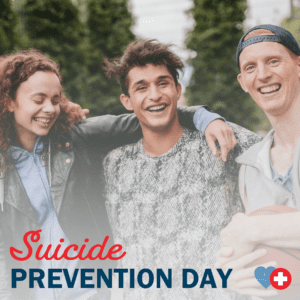Suicide Awareness Month — Warning Signs and How You Can Help
 September is Suicide Awareness Month, a time to learn the facts about suicide and help spread awareness on how to prevent it. The Centers for Disease Control and Prevention reports that in the United States in 2020, there were 45,979 deaths by suicide, which equals approximately one death every 11 minutes. Suicide is the fourth leading cause of death in Americans ages 34 to 54 and the second leading cause of death in people ages 10 to 33. Learning the facts about suicide can help you prevent a close friend or loved one from becoming part of this harrowing statistic. Read on to find out the key warning signs and how you can help someone who is contemplating suicide.
September is Suicide Awareness Month, a time to learn the facts about suicide and help spread awareness on how to prevent it. The Centers for Disease Control and Prevention reports that in the United States in 2020, there were 45,979 deaths by suicide, which equals approximately one death every 11 minutes. Suicide is the fourth leading cause of death in Americans ages 34 to 54 and the second leading cause of death in people ages 10 to 33. Learning the facts about suicide can help you prevent a close friend or loved one from becoming part of this harrowing statistic. Read on to find out the key warning signs and how you can help someone who is contemplating suicide.
Recognize warning signs and risk factors
Knowing and being able to recognize the warning signs of suicide is crucial to prevention. According to New Directions Behavioral Health, 80% of U.S. teens who have died by suicide showed warning signs prior to their death. Although some people may show little change in their behavior in the days leading up to a suicide attempt, it is more common for those contemplating suicide to display noticeable shifts in behavior and mood. Look out for these key warning signs:
- Expressing feelings of hopelessness or wanting to die
- Giving away prized or cherished possessions
- Talking about feeling like a burden to others or feeling unbearable pain
- Sleeping too little or too much
- Excessive use of alcohol and/or drugs
- Displaying heightened mood swings
- Withdrawing or isolating themselves more than usual
- Showing considerable signs of anxiety, rage or reckless behavior
- Showing a lack of interest in future plans
Suicidal tendencies can occur in individuals of all ages and backgrounds. Risk factors include mental health conditions such as depression and mood disorders, major life changes like job loss, financial setback or the death of a loved one, or a history of suicide in the family. Knowing these potential warning signs and risk factors and sharing them with others could help save a life.
How you can help
Talking about depression and suicide can be challenging, but open conversations about mental health can help eradicate stigma and misinformation. If you recognize any warning signs in a friend or family member that lead you to believe they may be planning suicide, follow these steps:
- Ask the person if they are thinking about suicide. While this seems daunting, it’s important to confirm their suicidal thoughts in order to help them.
- Start a conversation and listen to them as they open up about their problems and current emotional state. Withhold any judgment and create a safe environment for them to be vulnerable and communicate their feelings.
- Stay with the person or make sure they’re in a safe place with someone else watching over them until you can get help.
- Secure any dangerous belongings or weapons that may be in the suicidal person’s possession. You want to ensure that while they are in the process of getting help, they don’t have the opportunity to harm themselves.
- Call 911 if you think the danger of the person harming themselves is immediate. Otherwise, get help from one of the resources below.
Suicide prevention resources
If you or someone you know is in crisis, call 988 for immediate assistance from the 988 Suicide & Crisis Lifeline. In addition to dialing or texting 988, the 24/7 lifeline can be reached at 800-273-8255. You can also call a local counselor or therapist and schedule an urgent appointment to talk through your suicidal feelings. If you are employed or have health insurance, contact your Employee Assistance Program or call the behavioral health phone number on the back of your health insurance card.
If you are contemplating suicide, remember that you are not alone. Talk to someone you trust about your suicidal thoughts and get the help you need. For more information, visit 988lifeline.org.




